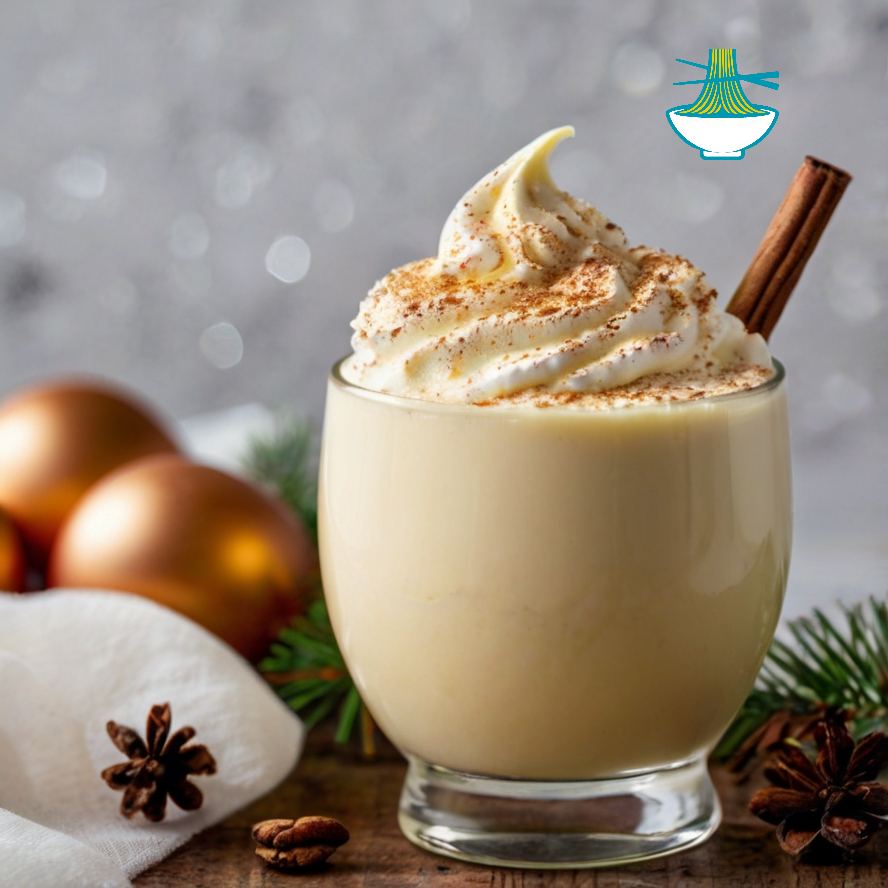Eggnog is a beloved, creamy spiced drink traditionally enjoyed during the winter holiday season, especially around Christmas. This indulgent beverage is perfect for celebrating Christmas and ringing in the New Year 2025 with its rich, comforting flavors. Whether served warm or cold, eggnog brings warmth to the holiday festivities, making it a festive favorite for families and friends. This easy-to-make recipe combines simple ingredients like milk, eggs, and spices to create a creamy, flavorful drink that is both delicious and nourishing. Packed with essential vitamins and minerals, such as vitamin A for healthy vision, vitamin D for calcium absorption, and calcium for strong bones, this drink also provides magnesium for muscle and nerve function and potassium for healthy blood pressure. Perfect for the winter holidays, eggnog is the ideal beverage to enjoy by the fire or share at your Christmas and New Year celebrations, adding a touch of holiday cheer to every moment.
Ingredients:
- 500 ml whole milk (can be replaced with almond milk or coconut milk for a dairy-free or plant-based version)
- 200 ml heavy cream (can be substituted with coconut cream or oat cream for a plant-based version)
- 4 large eggs (can use pasture-raised eggs or egg alternatives like whipped egg whites or egg white powder)
- 100 grams sugar (can be replaced with honey or coconut sugar for a healthier alternative)
- 1 teaspoon vanilla extract (optional: can be substituted with almond extract or organic vanilla for a more distinctive flavor)
- 1/2 teaspoon ground cinnamon (can add 1/4 teaspoon ground nutmeg or clove as a substitute or additional spice)
- 1/4 teaspoon ground nutmeg (optional: substitute with ground cardamom or white pepper for a unique flavor)
- 100 ml rum or brandy (optional: can be replaced with apple juice or ginger ale for a non-alcoholic version)
Preparation Steps:
1. Heat the milk and cream: In a medium saucepan, combine the whole milk and heavy cream. Stir continuously over medium heat until the mixture is warmed (it should not boil).
2. Whisk the eggs and sugar: In a separate mixing bowl, whisk the eggs and sugar until the mixture becomes light and creamy.
3. Combine milk and cream with egg mixture: Once the milk and cream are warm (but not boiling), slowly pour them into the egg mixture while whisking continuously to prevent curdling.
4. Add the spices: Stir in the ground cinnamon and nutmeg into the mixture, ensuring the flavors are well blended.
5. Add the rum or brandy: After the mixture has cooled slightly, add the rum or brandy, or replace it with apple juice or ginger ale for a non-alcoholic version.
6. Cool and serve: Remove from heat and let it cool for a few minutes before pouring into serving glasses. Optionally, garnish with a sprinkle of cinnamon or nutmeg on top.
7. Serve: Serve hot or cold, depending on preference. For a chilled version, add ice cubes to the glass.
Healthy Ingredient Substitutes:
- Whole milk: Replace with almond milk or coconut milk for a dairy-free or plant-based option.
- Heavy cream: Substitute with coconut cream or oat cream for a plant-based alternative.
- Eggs: Replace with whipped egg whites or egg white powder for a lighter version or plant-based alternative.
- Sugar: Use honey or coconut sugar for a healthier, more natural sweetener.
- Rum or brandy: For a non-alcoholic version, replace with apple juice or ginger ale.
Tips for Adding Extra Flavors in a Healthy Way:
1. Proper use of tools: It’s important to use a whisk (manual or electric) to properly mix the eggs and sugar to achieve a creamy consistency without any lumps. Ensure that the milk and cream are warmed but not boiling, as high heat can cause the eggs to curdle.
2. Using spices correctly: Cinnamon and nutmeg are the key flavors in eggnog, but you can experiment with adding a pinch of cardamom or clove for a unique twist. A bit of fresh ginger can also add a subtle, spicy note.
3. Garnishing and serving: To make the drink more festive, consider garnishing it with a dusting of cinnamon or a little bit of cocoa powder for a decorative finish. You could also serve it in frosted glasses for an extra touch of holiday cheer.
4. Flavor creativity: Try adding a drop of almond extract or orange zest to enhance the flavor profile. Freshly squeezed apple juice can also be used for a lighter, fruitier twist.
Enjoy your Eggnog with these healthy modifications to make it both delicious and nourishing!
Frequently Asked Questions (FAQ) About Eggnog Recipe
1. Can I make eggnog without using eggs?
Yes, you can make eggnog without eggs by using egg alternatives like whipped egg whites, silken tofu, or egg replacer powder. These alternatives help to achieve a creamy texture without the use of eggs. For a more traditional flavor, silken tofu works well as a base, and adding a touch of vanilla or almond extract will help mimic the rich taste of eggs. You can also try using a combination of coconut milk or almond milk with a thickener like agar agar or cornstarch to achieve the right consistency.
2. How can I make eggnog less sweet?
If you prefer a less sweet eggnog, you can reduce the amount of sugar used in the recipe. Instead of using the full 100 grams of sugar, start by cutting it in half or substituting with a natural sweetener like stevia, monk fruit, or erythritol. These alternatives provide sweetness without adding many calories or affecting the glycemic index. You can also add more spices like cinnamon or nutmeg to balance out the sweetness, giving it a more complex flavor.
3. How do I make eggnog thicker or creamier?
To make your eggnog thicker and creamier, consider using full-fat coconut milk or adding extra heavy cream. You can also increase the number of egg yolks used in the recipe, as they provide a rich, creamy texture. Another trick is to simmer the eggnog mixture longer over low heat (without boiling), which helps the proteins in the eggs thicken the liquid naturally. For a non-dairy version, adding a thickening agent like arrowroot powder or cornstarch can achieve a creamy texture.
4. Can I make eggnog ahead of time?
Yes, eggnog can be made ahead of time. It actually improves in flavor when it sits for a few hours or overnight, allowing the spices to meld together. If you plan to make it in advance, allow it to cool completely and store it in an airtight container in the refrigerator. For safety, be sure to consume the eggnog within 2-3 days, as it contains raw eggs. If you’ve used pasteurized eggs or egg alternatives, the shelf life may be slightly longer. Just give it a good stir before serving.
5. Can I make eggnog non-alcoholic and still retain the flavor?
Yes, you can make a non-alcoholic version of eggnog without losing much of the flavor. Instead of using rum or brandy, try replacing it with a combination of apple juice, ginger ale, or non-alcoholic vanilla extract. The key to retaining the flavor is to use high-quality spices (cinnamon, nutmeg, vanilla) and opt for a rich, creamy base like coconut milk or full-fat dairy. A small splash of orange juice can also enhance the depth of flavor and make the eggnog feel festive without the alcohol.
Nutrition Value:
1. 500 ml Whole Milk
- Calories: 310
- Carbohydrates: 24 grams
- Protein: 16 grams
- Fat: 17 grams
- Sodium: 100 mg
- Cholesterol: 55 mg
- Vitamins:
- Vitamin A: 500 IU
- Vitamin D: 120 IU
- Minerals:
- Calcium: 300 mg
- Phosphorus: 220 mg
- Nutritional Benefit: Whole milk is rich in calcium and vitamins A and D, which are essential for bone health, immune function, and vision. The fat content provides energy and helps absorb fat-soluble vitamins.
2. 200 ml Heavy Cream
- Calories: 400
- Carbohydrates: 3 grams
- Protein: 2 grams
- Fat: 43 grams
- Sodium: 40 mg
- Cholesterol: 150 mg
- Vitamins:
- Vitamin A: 900 IU
- Vitamin D: 20 IU
- Minerals:
- Calcium: 60 mg
- Magnesium: 10 mg
- Nutritional Benefit: Heavy cream is high in fat, which provides energy and supports the absorption of vitamins. It also contains vitamin A, which is essential for skin and eye health. However, due to its high cholesterol and fat content, it should be consumed in moderation.
3. 4 Large Eggs
- Calories: 280
- Carbohydrates: 2 grams
- Protein: 24 grams
- Fat: 20 grams
- Sodium: 220 mg
- Cholesterol: 740 mg
- Vitamins:
- Vitamin A: 540 IU
- Vitamin D: 100 IU
- Vitamin B12: 1.1 mcg
- Minerals:
- Calcium: 60 mg
- Iron: 1.8 mg
- Nutritional Benefit: Eggs are an excellent source of protein and healthy fats, which help in muscle repair and energy. They are also rich in vitamins A and B12, which are important for immune function, skin health, and nerve health.
4. 100 grams Sugar
- Calories: 387
- Carbohydrates: 100 grams
- Protein: 0 grams
- Fat: 0 grams
- Sodium: 0 mg
- Cholesterol: 0 mg
- Vitamins: None
- Minerals: None
- Nutritional Benefit: Sugar provides quick energy in the form of carbohydrates but lacks significant vitamins or minerals. While it enhances the flavor of eggnog, it should be consumed in moderation, especially if you are looking for a healthier alternative.
5. 1 Teaspoon Vanilla Extract
- Calories: 12
- Carbohydrates: 1.3 grams
- Protein: 0 grams
- Fat: 0 grams
- Sodium: 1 mg
- Cholesterol: 0 mg
- Vitamins:
- Vitamin B6: 0.05 mg
- Minerals:
- Calcium: 5 mg
- Nutritional Benefit: While low in calories, vanilla extract adds flavor and contains small amounts of vitamin B6, which plays a role in metabolism and brain function.
6. 1/2 Teaspoon Ground Cinnamon
- Calories: 3
- Carbohydrates: 1 gram
- Protein: 0 grams
- Fat: 0 grams
- Sodium: 0 mg
- Cholesterol: 0 mg
- Vitamins:
- Vitamin K: 1.4 mcg
- Minerals:
- Calcium: 26 mg
- Iron: 0.5 mg
- Nutritional Benefit: Cinnamon contains antioxidants and anti-inflammatory properties that support overall health. It also offers a boost of calcium and iron, which are important for bone health and red blood cell function.
7. 1/4 Teaspoon Ground Nutmeg
- Calories: 3
- Carbohydrates: 0.7 grams
- Protein: 0 grams
- Fat: 0.2 grams
- Sodium: 0 mg
- Cholesterol: 0 mg
- Vitamins:
- Vitamin A: 5 IU
- Vitamin C: 0.4 mg
- Minerals:
- Calcium: 6 mg
- Nutritional Benefit: Nutmeg is rich in antioxidants and can support digestive health. It also contains small amounts of vitamin A and calcium, contributing to better vision and stronger bones.
8. 100 ml Rum or Brandy (optional, can be replaced with non-alcoholic versions like apple juice or ginger ale)
- Calories: 250
- Carbohydrates: 6 grams
- Protein: 0 grams
- Fat: 0 grams
- Sodium: 0 mg
- Cholesterol: 0 mg
- Vitamins: None
- Minerals: None
- Nutritional Benefit: While alcohol provides energy in the form of calories, it doesn't offer significant vitamins or minerals. Non-alcoholic versions like apple juice or ginger ale can offer a refreshing, lower-calorie alternative with added vitamin C.
These ingredients combine to make eggnog a delicious and festive treat that, when enjoyed in moderation, can provide a combination of vitamins, minerals, and beneficial fats to support health during the winter holiday season.


Comments